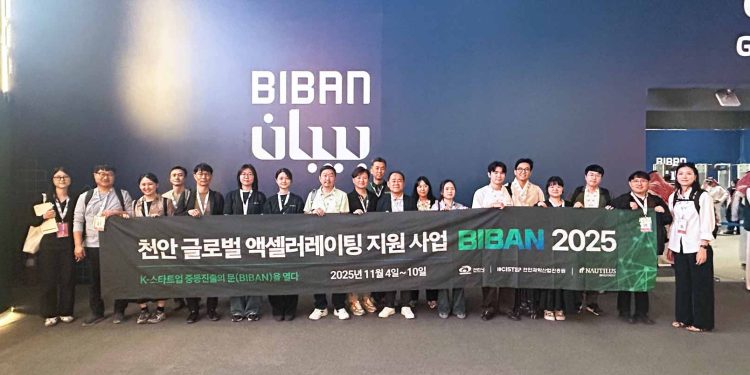Korea’s regional startup ecosystem is entering the global stage with newfound confidence. Twenty deep-tech startups from Cheonan secured USD 255 million (KRW 3.74 trillion) in investment agreements at BIBAN 2025 in Riyadh, Saudi Arabia. The milestone not only underscores the competitiveness of Korean startups in artificial intelligence, smart manufacturing, and healthcare innovation but also reflects deepening Korea–Middle East cooperation under Saudi Arabia’s Vision 2030 framework.
Cheonan Startups Sign USD 255 Million Investment Agreements at BIBAN 2025
Cheonan City announced that a delegation of 20 regional startups participated in the BIBAN 2025 global startup exhibition held in Riyadh from November 5 to 8, where they concluded 810 investment consultations leading to USD 255 million in agreements with international investors.
Hosted by the Saudi Small and Medium Enterprises General Authority, BIBAN is recognized as the Middle East’s largest startup and SME exhibition. This year’s event, themed “Vision 2030,” attracted more than 1,300 startups and 200,000 participants from around the world, positioning it as a major platform for cross-border innovation and investment.
Cheonan participated alongside the Korea Institute of Startup and Entrepreneurship Development (KISED), operating the largest delegation of K-Startup Pavilionthis year to support global market entry for regional innovation-driven firms. The delegation presented leading technologies across AI, smart manufacturing, digital healthcare, and eco-friendly innovation—core areas driving Korea’s industrial transformation.
Deep-Tech Innovation Takes Center Stage
Among the participating companies, Vision Innovation introduced an energy-saving plastic injection molding solution, while TMEVNet unveiled a cooling system designed for megawatt-level EV charging infrastructure. Rowain showcased a robotic vertical farming model aimed at advancing sustainable agriculture, and ThomasStone demonstrated a digital healthcare platform combining AI-driven oral imaging with blockchain-based data authentication.
Other participants included Weraser, Airbility, ABR, Kadea, VSL, Cicagen, Watervation, AEACBIO, Artmu, G&T, CowardLion, RoundStar, Addable, ADSystem, FreshHour, and SERA, all of which drew strong attention from investors and buyers across the Middle East and Asia.
A standout deal came from G&T, a flagship member of the Cheonan C-STAR (Cheonan Startup Acceleration and Research) program, which signed a USD 105 million (KRW 1.54 trillion) agreement with U.S. automotive partners.
Meanwhile, ThomasThon, SpaceMap, and Banff advanced to the global finals of the Entrepreneurship World Cup (EWC) 2025, representing Korea among startups from more than 200 nations.
Lawmakers and Industry Leaders Highlight Korea’s Regional Innovation Strength
Cheonan’s acting mayor Kim Seok-pil stated that the results validated the city’s sustained investment in innovation:
“Cheonan’s technology startups have proven their competitiveness on the world stage. We will continue to provide structured and strategic support to help local firms expand overseas investment and technology collaboration opportunities.”
Lee Jong-taek, Director of Cheonan’s Strategic Industry Bureau, emphasized the city’s long-term startup development framework:
“Cheonan is the only city in Korea that has systematically nurtured more than 400 startups over the past four years. Some have gone public on KOSDAQ, while others are leading advanced sectors such as aerospace and manufacturing. A city that grows startups is a city with a future.”
How Korea’s Regional Startups Are Shaping Global Innovation Networks
Cheonan’s participation in BIBAN 2025 marks a growing trend: Korea’s regional innovation clusters are becoming active players in international startup markets, especially in emerging ecosystems such as the Middle East. The event demonstrated how provincial cities are now leveraging government-backed acceleration programs and cross-border initiatives to attract foreign capital.
Saudi Arabia’s Vision 2030 has positioned the country as a gateway for global startups seeking entry into the MENA region. Korea’s engagement—through cities like Cheonan—illustrates how regional deep-tech ecosystems are contributing to Korea’s broader role as an Asia–Middle East innovation bridge.
The deals also highlight investor confidence in AI-based manufacturing, robotics, and digital health—sectors where Korean startups have established technological maturity and scalability. As industrial cooperation expands, Korea’s regional startups are expected to play a more strategic role in international joint ventures and innovation partnerships.
Korea’s Local Ecosystems, Global Ambitions
The investment success of Cheonan’s startups at BIBAN 2025 represents more than a financial milestone—it signals Korea’s transition into a multi-hub innovation economy where regional ecosystems can compete globally.
As Korea strengthens its economic cooperation with the Middle East under the Vision 2030 framework, Cheonan’s model of coordinated regional acceleration could serve as a blueprint for local-to-global innovation scaling.
By aligning smart manufacturing, AI healthcare, and sustainability-focused technologies with global investor demand, Korea’s startups are proving that innovation leadership is no longer concentrated only in Seoul—it is becoming truly nationwide and globally connected.
– Stay Ahead in Korea’s Startup Scene –
Get real-time insights, funding updates, and policy shifts shaping Korea’s innovation ecosystem.
➡️ Follow KoreaTechDesk on LinkedIn, X (Twitter), Threads, Bluesky, Telegram, Facebook, and WhatsApp Channel.






